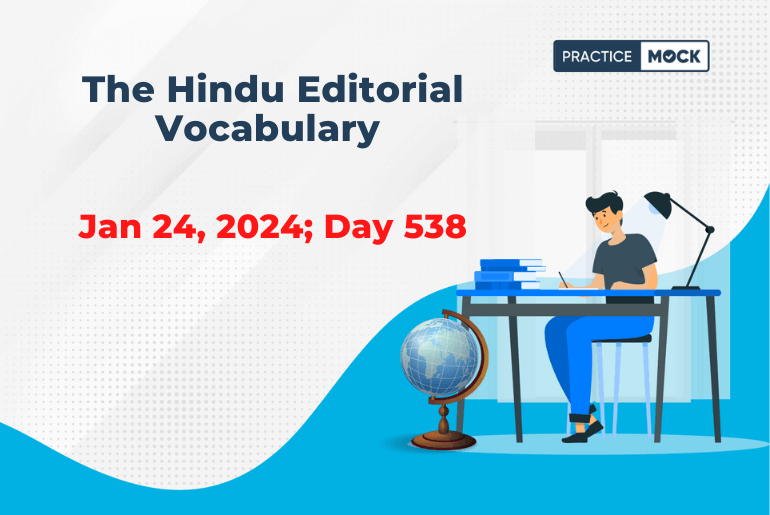The Hindu Editorial Vocabulary– January 24, 2024; Day 538


| Difficult Word/ Phrase | Contextual Sense |
| Litigation | The process of taking an argument between people or groups to a court of law |
| Jurisdiction | The authority of a court or official organization to make decisions and judgments |
| Consultation | A meeting to discuss something or to get advice |
| Breach | An act of breaking a law, promise, agreement, or relationship |
| Resolutions | An official decision that is made after a group or organization has voted |
| Acquires | To get or obtain something |
| Standardising | To make things of the same type all have the same basic features |
| Unauthorised | Without someone’s official permission to do something or be in a particular place |
| Prosecute | To officially accuse someone of committing a crime in a law court, or (of a lawyer) to try to prove that a person accused of committing a crime is guilty of that crime |
| Contraband | Goods that are brought into or taken out of the country secretly and illegally |
| Seizures | The action of taking something by force or with legal authority |
| Offenders | A person who is guilty of a crime |
| Notification | The act of telling someone officially about something, or a document, etc. that does this |
| Determining | To control or influence something directly, or to decide what will happen |
| Adjoining | With nothing in between, or touching |
Limits and borders: On the territorial jurisdiction of the Border Security Force
Centre must consult States before making decisions that impinge on their powers
Litigation (the process of taking an argument between people or groups to a court of law) concerning the territorial jurisdiction (the authority of a court or official organization to make decisions and judgment) of the Border Security Force (BSF) in Punjab seems to be the result of the lack of effective consultation (a meeting to discuss something or to get advice) between the central and State governments on the issue. Punjab has filed a suit against the Union government under Article 131 of the Constitution, challenging the decision to increase the operational jurisdiction of the BSF from 15 km to 50 km. The border State sees the Centre’s move as a breach (an act of breaking a law, promise, agreement, or relationship) of federal principles and an encroachment into the law and order powers of the Punjab police. West Bengal has a similar view, and both States have got resolutions (an official decision that is made after a group or organization has voted) passed in their Assemblies against the expansion. In this backdrop, the Supreme Court’s decision to examine the questions that arise from the expansion of the BSF’s area of operations acquires (to get or obtain something) significance. In October 2021, the Centre had issued a notification under the provisions of the BSF Act, standardising (to make things of the same type all have the same basic features) the area over which the BSF would have jurisdiction to operate. In Punjab, West Bengal and Assam, the distance was raised from within 15 km from the border to 50 km, while it was reduced from 80 km to 50 km in Gujarat. For Rajasthan, it was kept unchanged at 50 km. The Union government said in a reply in the Rajya Sabha in December 2021 that the extension of the BSF’s jurisdiction will help it discharge its border patrol duty more effectively.
While the Union government may have valid reasons for its move, it should not be seen as encroaching into the domain of the State governments, which have the constitutional responsibility to maintain public order and exercise police powers. The BSF mainly focuses on preventing trans-border crimes, especially unauthorised (without someone’s official permission to do something or be in a particular place) entry into or exit from Indian territory. It does not have the power to investigate or prosecute (to officially accuse someone of committing a crime in a law court, or (of a lawyer) to try to prove that a person accused of committing a crime is guilty of that crime) offenders, but has to hand over those arrested and the contraband (goods that are brought into or taken out of the country secretly and illegally) seized from them to the local police. In practice, BSF personnel usually work in close coordination with the police and there ought to be no clash of jurisdiction. It is possible to argue that the expanded jurisdiction merely authorises the BSF to conduct more searches and seizures (the action of taking something by force or with legal authority), especially in cases in which the offenders (a person who is guilty of a crime) manage to enter deep into the country’s territory. However, it goes without saying that there ought to be strong reasons for the expansion of the jurisdiction of any central force. In this regard, the most relevant questions among those framed by the Supreme Court are whether the Centre’s notification (the act of telling someone officially about something, or a document, etc. that does this) encroaches upon the State government’s domain; and what factors ought to be taken into account while determining (to control or influence something directly, or to decide what will happen) the “local limits of areas adjoining (with nothing in between, or touching) the borders of India”.
Unlock the power of words, one step further! Download the Lists of Word-Meanings of Previous Months here.
Recent Posts
Mensuration SSC CGL Questions, Basic Concept & Free Topic Tests
In this blog, we have provided the concept of the Mensuration SSC CGL Questions Exam…
SSC CGL Active Passive Questions PDF Download for Free
In this blog, we have provided the SSC CGL Active Passive Questions PDF. Practice free…
SSC CGL Practice Quiz With Answers, Attempt Daily Topic-wise Quiz
In this blog, we have provided the SSC CGL Topic-Wise Quiz for free. Candidates will…
Arithmetic Most Important Questions for RRB PO 2025 Exam, Download Free PDF
In this article we are providing the 150+ Arithmetic Questions for RRB PO Based On…
Simplification Expected Ques for RRB PO, Check Strategy to Solve Questions in 10 sec
In this article, we are providing a strategy to solve RRB PO Simplification in less…
SSC OTR Registration 2025: Aadhaar Enabled One Time Process Explained
This blog has provided the information related to the SSC Aadhaar Enabled One Time Registration…


